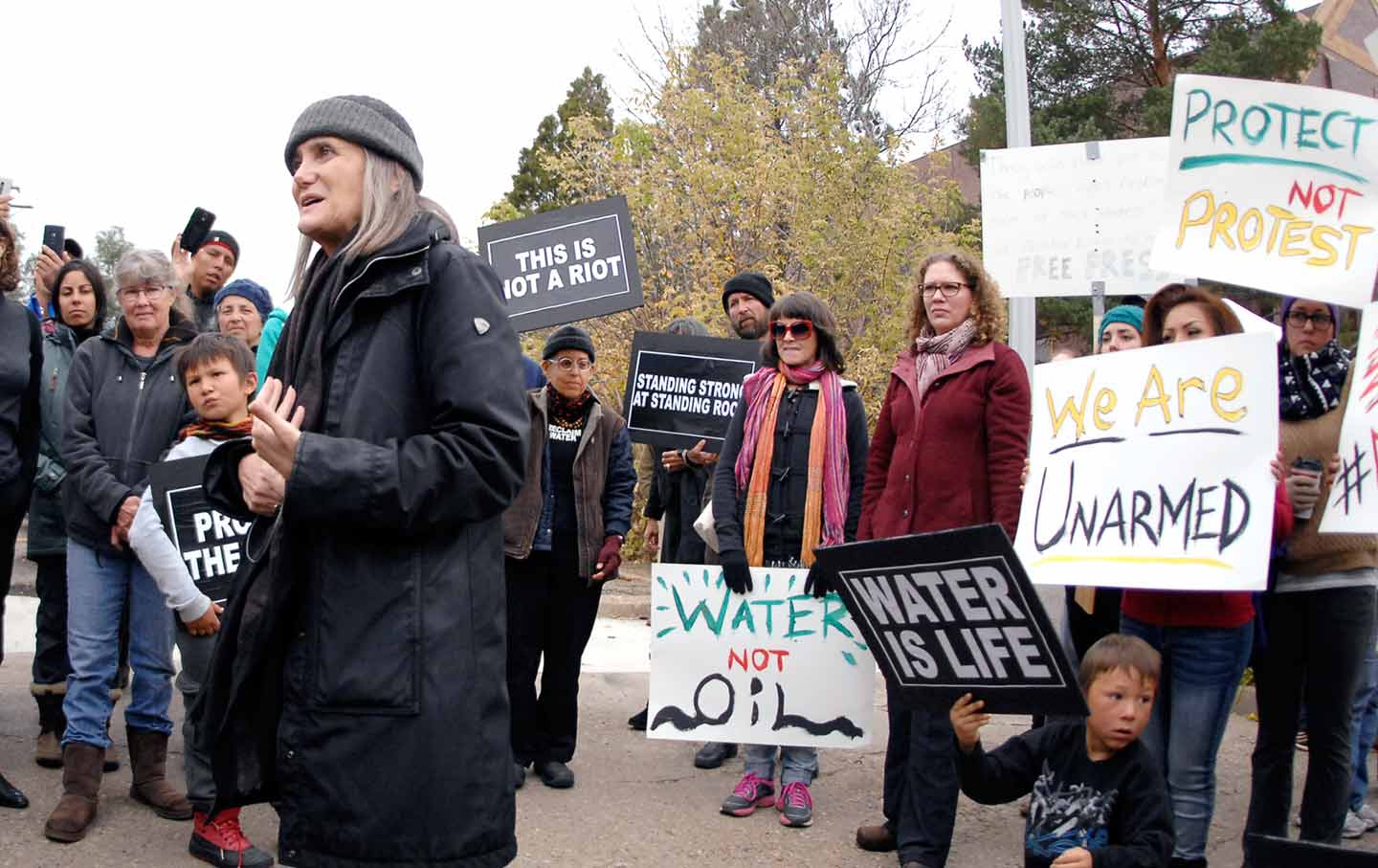
Journalist Amy Goodman, left, speaks with supporters in Mandan, North Dakota, before learning the rioting charge filed against her was dismissed by a South Central district judge on Monday, October 17, 2016.(AP Photo / Mike McCleary)
On October 17, in the small town of Mandan, North Dakota, District Judge John Grinsteiner came to the logical, if thrillingly refreshing, conclusion that journalism is not a crime. The inspiration for his decision was a case involving Amy Goodman, the award-winning journalist and host of Democracy Now!, who captured one of the defining moments of the Dakota Access pipeline protests in early September—an attack by private security contractors on Native American protesters—only to find herself slammed with an arrest warrant. In a notably warped reading of the law, North Dakota authorities sought to have Goodman charged with criminal trespass—then, when it appeared that charge wouldn’t stick, with riot. If Judge Grinsteiner hadn’t rejected the latter charge, Goodman faced the possibility of jail time or a sizable fine.
“The judge’s decision to reject State’s Attorney Ladd Erickson’s attempt to prosecute a journalist—in this case, me—is a great vindication of the First Amendment and of our right to report,” said Goodman, who had traveled to North Dakota to turn herself in, speaking to a crowd of supporters gathered outside the courthouse. To cheers and ululations, she added: “The state cannot stop this journalism.”
The news of Judge Grinsteiner’s decision rocketed throughout Goodman’s extensive, and passionate, audience. (Full disclosure: Goodman is a family friend, and I once worked for her.) But as much as her near-miss seemed to vindicate journalism’s protected status under the First Amendment, it also underscored what has become an alarming pattern across the prairies of North Dakota: a pattern of criminalizing the coverage of dissent—all the better, no doubt, to criminalize and quash dissent itself. During the week of October 10 alone, documentary filmmaker Deia Schlosberg was arrested in Walhalla while covering an anti-pipeline protest and charged with three felonies carrying a potential 45-year prison term, and actress Shailene Woodley was slapped in cuffs as she left a protest at a construction site; the police told her they had singled her out, she said, because she is “well-known.”
Meanwhile, the arrest of protesters—or “land protectors,” as they call themselves—has continued, accompanied by increasing reports of strip searches. And in case Goodman or her supporters were tempted to forget the power of the state as they waited for news of her fate on October 17, police officers in riot gear, looking like extras from the latest apocalyptic blockbuster, loomed nearby, hurling warnings through a bullhorn: “If you are on the roadway, you will be arrested.”
The story of how Goodman found herself facing criminal charges began on September 3, when she was covering what she calls “the stand-off at Standing Rock.” At the time, not one of the major American broadcast networks (ABC, CBS, NBC) had sent a reporter to cover the protests, despite the fact that they had already grown into the largest Native American mobilization in more than 40 years; none of the networks had even mentioned them, according to Jim Naureckas of Fairness and Accuracy in Reporting. But there was Goodman, standing at the edge of a sacred burial ground in the process of being churned into dirt. Clutching a microphone, she captured the scene as hundreds of protesters were confronted by security contractors armed with pepper spray and attack dogs—dogs straining against their leashes, dogs lunging at protesters, dogs biting them.
Within hours, Democracy Now! turned that footage into a potent video that quickly went viral and was featured, ultimately, on the same mainstream news stations that had ignored the protests. It was a rare crack in the consensus of silence—and, as Rolling Stone’s Matt Taibbi wrote, may well have influenced the Obama administration’s decision to halt work on the pipeline, if only temporarily.
Then, on September 8, like a well-timed backhand, a warrant was issued for Goodman’s arrest. The reason, according to prosecutor Erickson: Goodman wasn’t a journalist. “She’s a protester, basically,” he told the Grand Forks Herald. “Everything she reported on was from the position of justifying the protest actions.”
It’s worth pausing for a moment to parse the chilling absurdity of this statement: According to Erickson, a woman who appeared at a protest carrying a microphone emblazoned with the Democracy Now! logo and accompanied by a video crew; who could be heard in the resulting footage identifying herself as a reporter; and who then broadcast the report on the news program she’s hosted for 20 years, isn’t a journalist—and she’s not a journalist because she harbors a strong perspective that, apparently, clashes with his own. By this distorted logic, every muckraking news gatherer from Ida Tarbell to, yes, Matt Taibbi isn’t a journalist, but rather an activist flirting with arrest.
Hopefully, Judge Grinsteiner’s clear rejection of this logic has chastened Erickson—or at least served as a much-needed lesson on the First Amendment. And hopefully, it has reassured journalists that they are safe reporting a story that is not merely newsy but necessary. The Standing Rock struggle—a struggle against broken treaties, environmental injustice, and government-sanctioned theft—is older than this country, and as essential to its future as to its past. Yet without someone to hold a microphone to the protesters’ lips—or to record their arrests—the story risks getting lost. And we risk missing the message, radical and resonant, that was uttered by an activist toward the end of Democracy Now!’s viral video: “No one owns this land. This land belongs to the earth.
Lizzy RatnerLizzy Ratner is deputy editor for print at The Nation.